动词与名词的转换
英汉翻译中的词性转换

英汉翻译中的词性转换一、本文概述翻译,作为语言交流的桥梁,在跨文化、跨语言的交流中扮演着至关重要的角色。
英汉翻译,作为其中最为常见和重要的分支之一,其技巧与方法对于提高翻译质量和效率具有深远的影响。
在英汉翻译实践中,词性转换是一种常见的翻译技巧,其运用得当与否直接影响到译文的质量。
本文旨在探讨英汉翻译中的词性转换现象,分析其必要性、常见类型及其在英语汉语言特点下的应用,以期为翻译实践提供有益的参考和指导。
本文将简要介绍英汉翻译中词性转换的必要性,阐述为何在翻译过程中需要进行词性转换,以及这种转换对于提高翻译质量的重要性。
本文将详细分析英汉翻译中常见的词性转换类型,包括名词与动词之间的转换、形容词与副词之间的转换等,并结合具体实例进行说明。
本文将探讨英汉翻译中词性转换的应用策略,结合英语和汉语的语言特点,分析如何在实际翻译中灵活运用词性转换技巧,以实现译文的准确、流畅和地道。
通过本文的阐述和分析,希望能够帮助读者更好地理解和掌握英汉翻译中的词性转换技巧,提高翻译实践中的应变能力和翻译质量,推动英汉翻译事业的不断发展和进步。
二、词性转换的基本概念词性转换,即在翻译过程中,将源语言中的某一词类转换为目标语言中的另一词类,而不改变其原意,是英汉翻译中一种常见的翻译技巧。
这种技巧的运用,旨在使译文更加地道、流畅,更符合目标语言的表达习惯。
在英汉翻译中,由于两种语言的语法结构和表达习惯存在差异,因此,翻译时常常需要进行词性转换。
例如,英语中的动词在汉语中可能需要转换为名词、形容词或副词;同样,汉语中的名词在英语中也可能需要转换为动词、形容词或副词。
这种转换并不是随意的,而是需要基于对源语言和目标语言的理解和掌握,以及对翻译原则的遵循。
词性转换的翻译技巧可以分为两类:一是完全转换,即源语言中的某一词类完全转换为目标语言中的另一词类;二是部分转换,即源语言中的某一词类在转换为目标语言时,仍然保留部分原词类的特性。
动词名词形容词转换
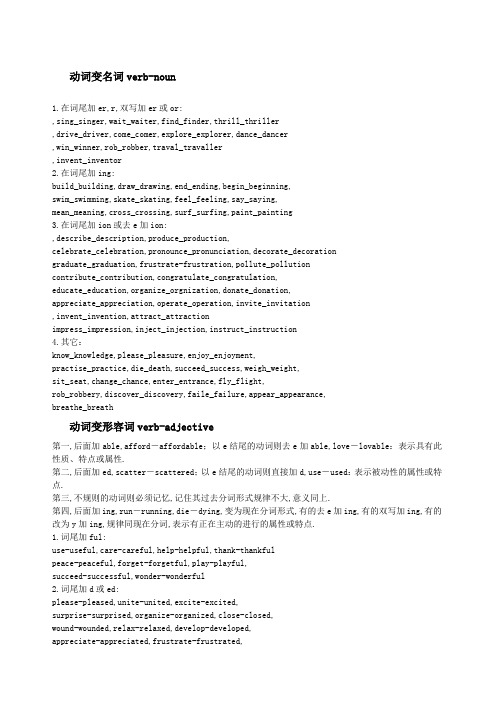
动词变名词verb-noun1.在词尾加er,r,双写加er或or:,sing_singer,wait_waiter,find_finder,thrill_thriller,drive_driver,come_comer,explore_explorer,dance_dancer,win_winner,rob_robber,traval_travaller,invent_inventor2.在词尾加ing:build_building,draw_drawing,end_ending,begin_beginning,swim_swimming,skate_skating,feel_feeling,say_saying,mean_meaning,cross_crossing,surf_surfing,paint_painting3.在词尾加ion或去e加ion:,describe_description,produce_production,celebrate_celebration,pronounce_pronunciation,decorate_decorationgraduate_graduation,frustrate-frustration,pollute_pollutioncontribute_contribution,congratulate_congratulation,educate_education,organize_orgnization,donate_donation,appreciate_appreciation,operate_operation,invite_invitation,invent_invention,attract_attractionimpress_impression,inject_injection,instruct_instruction4.其它:know_knowledge,please_pleasure,enjoy_enjoyment,practise_practice,die_death,succeed_success,weigh_weight,sit_seat,change_chance,enter_entrance,fly_flight,rob_robbery,discover_discovery,faile_failure,appear_appearance,breathe_breath动词变形容词verb-adjective第一,后面加able,afford-affordable;以e结尾的动词则去e加able,love-lovable:表示具有此性质、特点或属性.第二,后面加ed,scatter-scattered;以e结尾的动词则直接加d,use-used:表示被动性的属性或特点.第三,不规则的动词则必须记忆,记住其过去分词形式规律不大,意义同上.第四,后面加ing,run-running,die-dying,变为现在分词形式,有的去e加ing,有的双写加ing,有的改为y加ing,规律同现在分词,表示有正在主动的进行的属性或特点.1.词尾加ful:use-useful,care-careful,help-helpful,thank-thankfulpeace-peaceful,forget-forgetful,play-playful,succeed-successful,wonder-wonderful2.词尾加d或ed:please-pleased,unite-united,excite-excited,surprise-surprised,organize-organized,close-closed,wound-wounded,relax-relaxed,develop-developed,appreciate-appreciated,frustrate-frustrated,interest-interested,annoy-annoyed,use-used,frighten-frightened,crowd-crowded,thrill-thrilled,pollute-polluted3.词尾加ing:interest-interesting,surprise-surprising,excite-excitingdevelop-developing,frighten-frightening,thrill-thyrillingfrustrate-frustrating,relax_relaxing,live-livingrock-rocking,sleep-sleeping4.词尾变y为i,加ed:worry-worried,marry-married,fry-fried,terrify–terrified,satisfy-satisfied 5.词尾加able:know-knowledgeable,enjoy-enjoyabe,suit-suitableadjust-adjustable,comfort-comfortable6.其它:lose-lost,fool-foolish,live-lively/alive/living,sleep-sleepy/sleeping/asleep,wake-awake,taste-tastyspeak-spoken,break-broken,die-dead,educate-educational,world-worldwide。
英语单词词性分类:动作和名词的转换
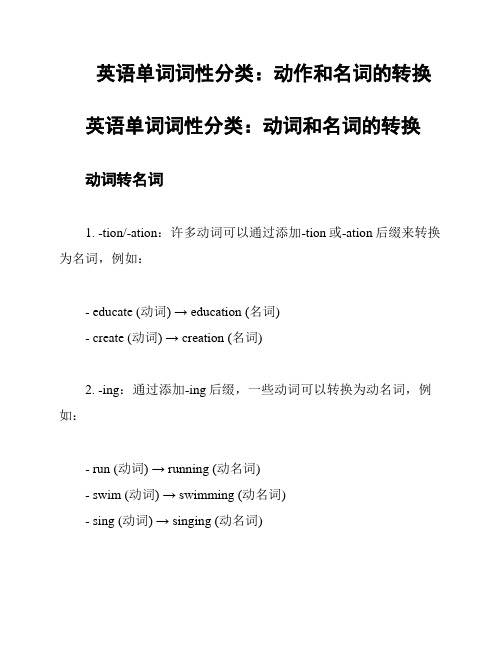
英语单词词性分类:动作和名词的转换英语单词词性分类:动词和名词的转换动词转名词1. -tion/-ation:许多动词可以通过添加-tion或-ation后缀来转换为名词,例如:- educate (动词) → education (名词)- create (动词) → creation (名词)2. -ing:通过添加-ing后缀,一些动词可以转换为动名词,例如:- run (动词) → running (动名词)- swim (动词) → swimming (动名词)- sing (动词) → singing (动名词)3. 不规则变化:还有一些动词转换成名词时存在不规则的变化,例如:- lose (动词) → loss (名词)- win (动词) → win (名词)- teach (动词) → teaching (名词)名词转动词1. -ize/-ise:通过添加-ize或-ise后缀,一些名词可以转换为动词,例如:- globalization (名词) → globalize (动词)- organization (名词) → organize (动词)- realization (名词) → realize (动词)2. 形容词转动词:一些名词也可以通过添加动词to be的形式来转换为动词,例如:- success (名词) → succeed (动词)- failure (名词) → fail (动词)- change (名词) → change (动词)3. 不规则变化:还有一些名词转换成动词时存在不规则的变化,例如:- child (名词) → child (动词)- water (名词) → wa ter (动词)- dog (名词) → dog (动词)以上是英语单词词性分类中,动词和名词的转换方式的简要介绍。
希望对您学习英语有所帮助!。
高中英语知识点归纳名词与动词的转化

高中英语知识点归纳名词与动词的转化英语语法中,名词和动词是一对重要的词类,它们在句子中扮演着不同的角色和功能。
而在某些情况下,名词和动词之间可以通过一些转化的方法相互转换。
本文将从几个常见的角度总结归纳高中英语中名词和动词的转化。
一、名词转动词1. 加“-ize”或“-ify”将名词转化为动词的一种常见方法是在名词的词尾加上“-ize”或“-ify”。
例如:- 名词:global(全球)动词:globalize(全球化)- 名词:beauty(美丽)动词:beautify(美化)这种方式常用于表示将某事物进行某种处理或转变的动作。
2. 加前缀“en-”另一种将名词转化为动词的方式是在名词前面加上“en-”。
例如:- 名词:light(光)动词:enlighten(启发,开导)- 名词:length(长度)动词:lengthen(延长)这种方式常用于表示使某物具有某种特征或状态。
3. 加前缀“re-”有时,我们还可以通过在名词前面加上“re-”来转化为动词,表示重新做某事。
例如:- 名词:do(工作、任务)动词:redo(重新做)- 名词:build(建造)动词:rebuild(重建)这种方式常用于表示对以前做过的事情进行重复或重新进行。
二、动词转名词1. 加后缀“-ing”最常见的将动词转化为名词的方式是在动词词尾加上“-ing”。
例如:- 动词:run(奔跑)名词:running(跑步)- 动词:write(写)名词:writing(写作)这种方式常用于表示某个动作或状态。
2. 加后缀“-tion”或“-sion”有些动词可以通过在词尾加上“-tion”或“-sion”来转换成相应的名词。
例如:- 动词:inform(通知)名词:information(信息)- 动词:expand(扩大)名词:expansion(扩张)这种方式常用于表示某种行为、结果或状态。
3. 加后缀“-ment”另一种常见的动词转名词的方式是加上“-ment”后缀。
英汉互译中名词和动词互相转换(与“汉语”有关的文档共13张)
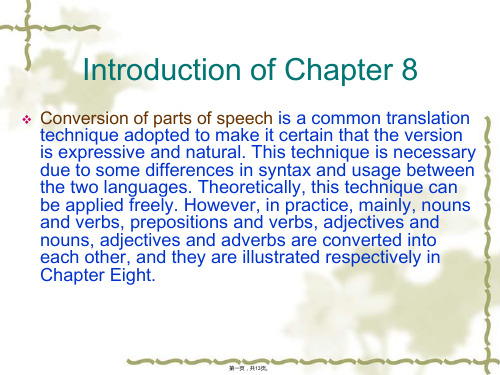
第八页,共13页。
英语形容词和汉语副词相互转译
英汉互❖译中在名词英和动译词互汉相转过换 程中,如果英语句子中的名词转换为汉语句子中的
形容词或动词,那么原文中修饰名词的英语形容词就往往相应 (29)她甘愿留在家里。
Film stars are objects of admiration for most girls.
now, and understood the art of living exemplary coldness toward Miss de
in La
他Sh快e 速is 地co瞥nMte了n我toto一lse眼ta。y.a于t hom连e. 当时已经成了个浪荡子,懂得巴黎的生活艺术。他对德 当今掌握两拉门或莫更多尔种外小语是姐很重刻要的意。 地冷淡。
❖ 他坚持说自己无罪,这引起了一些记者的注意。
❖ (2)She has a firm conviction that she will overcome all the difficulties. ❖ 她坚信她会克服所有的困难。 ❖ (3)She flared up at the sight of her husband walking with another
英汉互译中名词和动词互相转换
动词转换成名词
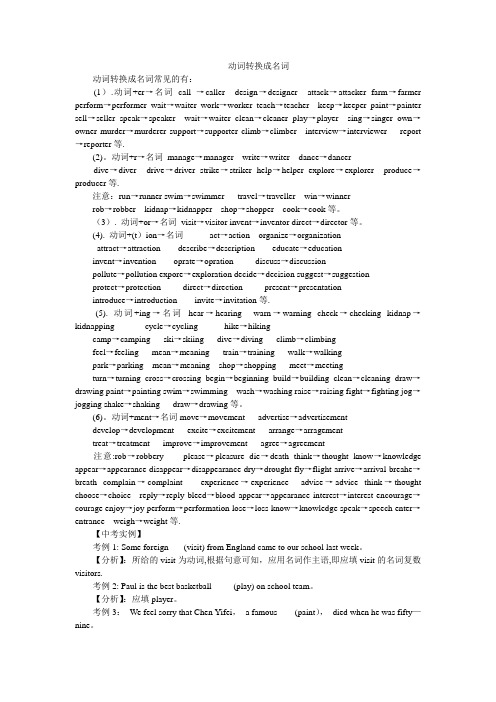
动词转换成名词动词转换成名词常见的有:(1).动词+er→名词call →caller design→designer attack→attacker farm→farmer perform→performer wait→waiter work→worker teach→teacher keep→keeper paint→painter sell→seller speak→speaker wait→waiter clean→cleaner play→player sing→singer own→owner murder→murderer support→supporter climb→climber interview→interviewer report →reporter等.(2)。
动词+r→名词manage→manager write→writer dance→dancerdive→diver drive→driver strike→striker help→helper explore→explorer produce→producer等.注意:run→runner swim→swimmer travel→traveller win→winnerrob→robber kidnap→kidnapper shop→shopper cook→cook等。
(3). 动词+or→名词visit→visitor invent→inventor direct→director等。
(4). 动词+(t)ion→名词act→action organize→organizationattract→attraction describe→description educate→educationinvent→invention oprate→opration discuss→discussionpollute→pollution expore→exploration decide→decision suggest→suggestionprotect→protection direct→direction present→presentationintroduce→introduction invite→invitation等.(5). 动词+ing→名词hear→hearing warn→warning check→checking kidnap→kidnapping cycle→cycling hike→hikingcamp→camping ski→skiing dive→diving climb→climbingfeel→feeling mean→meaning train→training walk→walkingpark→parking mean→meaning shop→shopping meet→meetingturn→turning cross→crossing begin→beginning build→building clean→cleaning draw→drawing paint→painting swim→swimming wash→washing raise→raising fight→fighting jog→jogging shake→shaking draw→drawing等。
英语词性转换归纳

动词变名词1.v+ ment 结尾achieve---achievement 成就advertise--- advertisement// advertisingagree— (in )agreementapartment 公寓amusement 娱乐argue---argument争吵commit奉献—commitmentcompliment 称赞,恭维develop---developmentdisgree—disagreementdepartment 局,部experiment 实验,试验equip 装备---equipment 装备,器材govern 统治—government 政府manage---management 经营管理2.V+ tion 结尾attract吸引—attraction 有吸引力的事或人;令人向往的地方conclude—conclusion 结论compete—competition 竞争,比赛discuss—discussion 讨论educate-----educationdecide----decisiondescribe—description描写,描绘express 表达----expression 词语;表达方式graduate 毕业—graduationoperate 操作,动手术—operationorganize----organization instruct—instruction 指导,介绍invent—inventor / invention invite—invitationinspire---inspiration 灵感,鼓舞人心的--- pollute----pollution 污染predict---prediction 预言pronounce ---pronunciationresolve 决心-----resolution 决心permit 允许-----permissionsuggest-建议,暗示--suggestionsolve解决-----solution 解决方法3.V+ ance 结尾appear—appearance 外貌,出现perform----performance 演出4.V+ ing 结尾bathe 洗澡---bathingend 结束----ending 结尾,结局train 训练---trainingmean ---- meaning 意义say-----saying 谚语5.V+ 其他Beg(乞讨)—beggar 乞丐behave 行为,举止----behaviorknow---knowledgefly—flight 飞行heat 加热---heat 热量hit 撞击------hit 轰动一时的人或物,碰撞mix 混合-----mixture 混合物press 按,压—pressure 压力sit-----seat 座位succeed-- successtour 在-----旅游,在-----作巡回演出直接+地点 tour China ---tour 旅游/ tourist 游客名词变形容词1.名词+yAnger 生气-----angryhunger---hungryfog—foggy有雾的fur----furry 毛皮的guilt 罪恶---guilty 内疚的health---healthyluck---luckycloud---cloudywind—windyrain---rainysnow---snowysun—sunnytourist------touristy 游客多的business---busysalt 盐--- salty 咸的shine---shiny 发亮的silk 丝绸—silky 丝绸般的sleep---sleepy 昏昏欲睡的taste 口味,品味------tasty 甜的2.名词+ edbalance –balanced 平衡的spot 斑点,地点----spotted 有斑点的talent-----talented 有天赋的organized 有组织的distusted 厌恶的offended 生气的crowded 拥挤的polluted 被污染的pleased 高兴的3.名词+ ful/less meaning—meaningful 有意义的care—careful/ careless 小心的;粗心的help---helpful / helpless home—homeless 无家可归的colour---colourfulpain 疼痛---painful 痛苦的use---useless/ usefulthank—thankful 充满感激的peace 和平 ---- peaceful 平静的,宁静的playful 顽皮的,爱玩耍的4.名词+ ableadjustable 可调整的comfort---comfortableknowledge---knowledgeablesuit 一套-----suitable 合适的5.名词+ ousenormous 巨大的danger—dangerousmystery 神秘-----mysterious 神秘的6.ce 变 tconfidence----confidentdifference---different7. al 结尾medicine 药----medical 医学的music---musicalnature---natural 自然的person---personal (私人的) nation—national 国家的education---educational有教育意义的tradition----traditional 传统的origin起源---original 新颖的;独创的8.名词+ lyfriend—friendlylive---lively 活跃的,有生气的love—lovely 可爱的9.+ en 结尾wood—wooden 木制的wool—woolen 羊毛的10. 其他energy精力---energeticfool 傻子—foolish 愚蠢的freedom 自由—free 空的,免费的height 高度—highillness 疾病--- ill love—loving 慈爱的death---deadpleasure---pleasant / pleased popularity 流行性—popular pride---proudscientist----scientific 科学的方位的词表达名词—形容词East—easternWest—westernSouth—southernNorth---northernIn the west of ChinaIn the western part of China四大洲名词-----形容词Asia 亚洲–---- AsianAfrica 非洲----- African Europe欧洲----- European America 美洲-----American形容词变副词1.形容词+ lybad—badlybright—brightly 明亮地casual—casually 随意地clear—clearly 清楚地complete—completely 完全correct---correctly 正确地final--finallyfortunate—fortunately幸运地general—generally 一般来讲loud—loudlyparticular 特殊的,独特的—particularly polite—politelyproper 合适的-,恰当的---properlymain------mainly 主要地most 多数-----mostly 多半,大多数normal---normally 正常地quick—quicklyquiet—quietly 轻轻地,安静地real—reallyrecent 最近的----recently 最近;近来hard 难的;努力地---hardly 几乎不late 迟的—lately 最近;近来sad--sadlyslow---slowlyspecial—specially 专门,特殊地specific---specifically 特定地,明确地strong—strongly 坚决地,强烈地sudden—suddenly突然usual—usually2. 以le 结尾的去e + ycomfortable---comfortablygentle—gentlypossible---possiblysimple ----simply 仅仅;只;简单地terrible---terribly3. 辅音字母+ y 变 ilyeasy—easilyheavy—heavilyhappy--happily4.特殊good—well好地 well 身体健康的,井true—truly名词---形容词—副词beauty 美,美人—beautiful—beautifully care—careful—carefully care—careless—carelesslydifference---different---differently happiness—happy—happily hunger—hungry--hungrily health—healthy—healthily luck—lucky—luckily noise—noisy—noisily pride—proud—proudly骄傲地sadness—sad—sadlysafety 安全;安全的地方—safe—safely silence—silent---silently 默默地success—successful—successfully truth—true—truly unluck—unlucky—unluckilywonder 奇迹—wonderful—wonderfully既是形容词又是副词early get up early ;an early trainlate be late for classcome late for schooldeep dive deep into the seaa hole deep largehigh jump high;a high mountainhard a hard question;a hard stone work hard / study hardrain hardlong It takes too longIt takes a long timefar jump farMy home is far from school straight a straight linego straight along here三 . 派生:指由一个词根加上前缀和(或)后缀构成另一个词的构词形式。
英语词性转换规则大全

英语词性转换规则大全(1).动词转化为名词,post-postage mail-mailweigh-weight advise-advice(2)动词转化成名词-形容词act-actor / actress-activechange-change-changeable(3) 动词转化成形容词,副词,名词fill-fullneed-necessary-necessarilyinterest(v. / n.) interested /interesting(4)n. a. n. a.名词转化为形容词person personal ( 个人的; 私人的 )fun funny(5)n. pl. n. pl.名词转化为名词复数gentleman gentlemen human humans(6)a. ad. a. ad.形容词转化为副词possible possibly probable probably(7)a. ad. n.形容词转化为副词,名词true truly truthlucky luckily luck(8)原级比较级最高级far farther / further farthest / furthestlittle less least一、名词变为形容词的方法1. 在名词后面加-y可以变成形容词(尤其是一些与天气有关的名词)。
例如:rain—rainy, cloud—cloudy, wind—windy, snow—snowy, health—healthy, luck—lucky等。
注意:1)如果名词以重读闭音节结尾,且词尾只有一个辅音字母,这时应双写词尾的辅音字母再加-y。
如:sun—sunny, fun—funny等。
2)少数以不发音的e结尾的名词变为形容词时,应去掉e再加-y。
例如:noise—noisy, ice—icy 等。
2. 一些抽象名词在词尾加-ful可以变为形容词。
例如:care—careful, thank—thankful, help—helpful, use—useful, beauty—beautiful等。
英语单词词性转换

英语单词词性转换一、动词v.→名词n.1、词尾加上-er或-or之后就变成了表示"某一类人"的名词例如:work—worker, teach—teacher, sing—singer,jump—jumper, play—player, learn—learner,visit—visitor, invent—inventor,collect—collector等.注意:1以不发音的e结尾的动词,在词尾加-r.例如:drive—driver, write—writer等.2以辅音字母开头并以元音字母加辅音字母结尾的单词,应双写末尾的辅音字母再加er; 例如:run—runner, win—winner,begin—beginner等.2.在动词词尾加上-ment 变成名词例如:achieve—achievement 成就advertise—advertisement例如:argue—argument争论3.在动词词尾加上-tion/sion变成名词例如: attract—attraction; instruct—instruction;invent—invention discuss—discussion;express—expression educate—education;graduate—graduation; operate—operation 去e再加"ion"compete—competition; organize—organization 把e改成其他字母再加"tion"decide—decision conclude—conclusion 把de改为s再加"ion"describe—description描写,描绘这是特例,不规则变化4.在动词词尾加上-ance变成名词例如: appear—appearance 外貌;出现perform—performance 演出accept—acceptance 接受resist-resistance n.抵抗,阻力5.在动词词尾加-ing变成名词方法与动词变为现在分词的方法相同例如:meet—meeting build—building wait—waitingbathe—bathing say—saying谚语 mean—meaning注意:以辅音字母开头并以元音字母加辅音字母结尾的单词,应双写末尾的辅音字母再加-ing 如:swim—swimming shop—shopping begin—beginning二、动词v.→形容词adj.1.动词后面加able,以e结尾的动词则去e加able,表示具有此性质,特点或属性.例如: afford-affordable;love-lovable2.动词后面加ed,以e结尾的动词则直接加d,表示被动性的属性或特点.例如: scatter-scattered use-used3不规则的动词则必须记忆,记住其过去分词形式.规律不大,意义同b.三.名词n.→形容词adj.1.在名词后面加-y可以变成形容词尤其是一些与天气有关的名词例如: rain—rainy, cloud—cloudy, wind—windy, snow—snowy,health—healthy, luck—lucky,anger—angry guilt—guilty内疚的tourist—touristy游客多的 , salt 盐—salty 咸的silk丝绸—silky丝绸般的, sleep—sleepy 昏昏欲睡的注意:1如果以辅音字母开头并以元音字母加辅音字母结尾,这时应双写辅音字母再加"-y".如: sun—sunny, fun—funny, fog—foggy有雾的, fur—furry毛皮的2少数以不发音的e结尾的名词变为形容词时,应去掉e再加"-y".如: noise—noisy, ice—icy, shine—shiny发亮的, taste口味—tasty甜的2.名词后面加-ed,以e结尾的直接加d.例如: spot斑点—spotted有斑点的; talent—talented 有天赋的organize—organized 有组织的; balance—balanced平衡的3.一些抽象名词在词尾加-ful可以变为形容词例如:care—careful, thank—thankful, help—helpful,use—useful, meaning—meaningful4.在名词后加-less构成含有否定意义的形容词例如:care—careless粗心的, use—useless无用的hope—hopeless没希望的,home—homeless无家可归的5.一些以-ce结尾的名词,把-ce改为-t变成形容词例如: difference—different, silence—silent, confidence—confident 6.在名词后加-ly变为形容词例如: friend—friendly, love—lovely, live---lively7.在名词后加-ous变为形容词例如: danger—dangerous prosperous a 繁荣的pro 在前+sper 希望+ous 8.名词后面加-al变为形容词例如: music—musical; medicine—medical 这个比较特殊9名词后面加-able变为形容词,如果以e结尾就去e再加"-able".例如: adjust—adjustable 可调整的 value—valuable有价值的10.名词后面加-en变成形容词例如: wood—wooden 木制的 wool—woolen 羊毛的四.形容词adj.→副词adv.▲一般在形容词的词尾加-ly可以变成副词例如: quick—quickly, slow—slowly, loud—loudly, sudden—suddenly 等例如:possible—possibly, terrible—terribly。
动词与名词的词性转换GQ
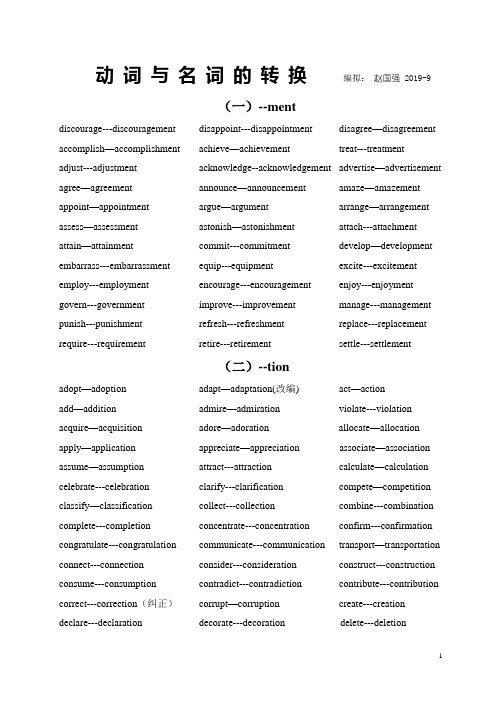
(十)其他变化形式:
analyze /se—analysisapplaud—applause bathe—bath
behave—behaviorbelieve—belief bleed—blood
bury—burialcompare---comparison die—death
employ---employmentencourage---encouragementenjoy---enjoyment
govern---governmentimprove---improvementmanage---management
punish---punishmentrefresh---refreshmentreplace---replacement
reflect---reflectionregulate---regulationreject---rejection
relate---relationrelax---relaxationrepeat---repetition
reserve—reservationsatisfy---satisfactionselect---selection
find---findings(多用pl.:最终发现的东西,调查结果,判决)gather---gathering
greet---greetings(多用复数)hear---hearing(听力,听觉)warn---warning mourn—mourningmisunderstand---misunderstandingopen---opening save(救,节约)---savings(储蓄)say---saying(格言)suffer---suffering
动词与名词的转换

词语变形归纳★动词与名词的转换(v.----n.)(一)--mentabandon—abando nment accompli sh—accompl ishm ent achiev e—achievementacknowl edge---acknowledge mentadjust---adjust mentadverti se—adverti seme ntagree—agreem ent amaze—amazem ent announ ce—announ cemen tappoin t—appoin tment argue—argume nt arrang e—arrang ementassess—assess mentastoni sh—astoni shmen t attach---attach mentattain—attain mentcommit---commit mentdevelo p—develo pmentdisagree—disagreemen t disapp oint---disapp ointm ent discou rage---discou ragem ent embarra ss---embarra ssme nt equip---equipm ent excite---excite mentemploy---employ mentencourage---encourageme nt enjoy---enjoym entgovern---govern mentimprov e---improv ement manage---manage mentpunish---punish mentrefresh---refreshment replace---replacementrequire---requirement retire---retire mentsettle---settle menttreat---treatm ent(二)--tionabolish—aboliti on absorb—absorp tionaccumul ate—a ccumu latio naccuse—accusa tionacquire—acquisi tion adapt—adapta tion(改编(本) add—additi on admire—admira tionadmit—admissi onadopt—adopti on adore—adorat i on alloca te—alloca tionapply—application appreci ate—appreci atio n associ ate—associ ationassume—assump tionattract---attractioncalcul ate—calcul ationcancel—cancel latio n celebrate---celebration clarify---clarifi cati onclassi fy—classi fi cati on collect---collectioncombin e---combin ationcommuni cate---communi cati on compen sate—compen satio n compet e—competi tioncomple te---comple ti oncompro mise---compro mi seconcen trate---concen trati oncondem n---condem natio n confirm---confirmatio n congra tulat e---congra tulati onconnect---connectionconsid e r---consid erati on construct---constru ctio nconsum e---consum ption contra dict---contra di cti on contri bute---contri butio ncorrect---correction(纠正,改正之处)corrup t—corrup tioncreate---creati ondeclare---declaration decora te---decora ti ondelete---deleti ondescri be—descri ption destro y---destru ction determ i ne---determ i nati ondevote---devoti on discri minat e—discri minati on distri bute--distri butio ndonate---donati on elect---electi on erupt---erupti onevalua te—evalua tionexamin e---exam(inatio n) found---founda tionexpect---expect ation explai n---explan ation explore---explorationgradua te---gradua tionhesita te---hesita tionimagin e---imagin ation1inform---inform ation inspect---inspectioninspire---inspirationinstru ct---instru ction intend---intenti on interr upt---interruptio nintrod uce---introd uctio n invent---inventi on invite---invita tionirriga te---irriga tionmultip l y---multip li cati on negoti ate---negoti ationobserv e---observ ation occupy---occupa tionoperat e---operati onorgani ze---organi zatio n partici pate---partici pati on pollut e---polluti onpredic t---predic tionprepare---preparation prescri be---prescri ptio npreserve---preservatio n preven t---preven tionproduce---productionprohib i t---prohib i tion promote---promoti on pronou nce---pronun ciati onprotect---protectionqualify---qualifi cati on react—reacti onrealiz e---realiz ation recomm end---recomm endati on reduce---reducti onreflect---reflectionregula te---regula tionreject---rejecti onrelate---relati on relax---relaxa tionrepeat---repeti tionreserv e—reserv ation satisfy---satisfactio n select---selecti onsepara te---separa tionsimpli f y---simpli fi cati on starve---starva tionsuggest---suggestiontransform---transfo rmati on transl ate---transl ationtransp ort---transp ort/transp ortat i on violate---violat ion(三)---sionconclu de---conclu si onconfuse---confusi on decide---decisi ondiscuss---discussiondivide---divisi on explod e---explosi onexpress---expres sionextend---extensi on impress---impressi onpersua de---persua sionposses s---posses sionrevise---revisi on(四)--turedepart—depart ure fix---fixture(固定物) furnis h---furnit uremix---mixture sign---signat ure(五)--ceaccept—accept anceadvise—advice allow---allowa nceannoy—annoya nce appear—appearanceavoid—avoida ncedefend—defence differ---differencedisapp ear---disapp earan cedisturb---disturbance exist---existe n ce ignore---ignora n ceinsure---insura n ce notify(通知v.)---notice(注意到v.)—notice(通知,注意n.) obey---obedie n ce occur---occure n ce offend---offence perform---performanceprefer—preferencepreten d---preten ce resembl e---resemblanceresist---resist ancetolera te---tolera n ce choose—choice2(六)--alapprov e—approv al arrive—arrival betray—betray aldismis s—dismis sal refuse---refusa l remove---removalsurviv e---surviv al(七)-ar/or/er(特殊的)beg—beggar compet e—competi torconduct---conductoredit—editor educate---educat or hang---hanger(衣架,挂钩)—hang(绞刑吏) contai n—contai ner(容器) laugh—l aught er operat e—operat orremind---reminder(提醒物) rob---robber(盗贼) sharpe n---sharpe ner(削刀,磨器) shave---shaver(刮胡刀) terrify---terror transl ate---transl atorvisit---visito r win---winner(八)-ing(s)belong—belongi ngsbless—blessi ngs(多用复数,偶尔用单数)earn---earnin gs feel---feelin g (可数) fill---fillin g(填充物)find---findin gs(多用pl.:最终发现的东西,调查结果,判决) gather---gatheri nggreet---greeti ngs(多用复数) hear---hearin g(听力,听觉) misundersta nd---misund ersta nding mourn—mourni ng open---openin g save(救,节约)---saving s(储蓄)say---saying(格言) suffer---sufferi ng surrou nd---surrou nding swarn---warnin g(九)--yapologi ze /se—apolog y consis t---consis tency delive r---delive rydiscov er---discov ery enquire---enquiry equal—equali tyinjure---injury recove r---recove ry summari ze---summarytend---tenden cy unite---unity(十)其他变化形式:analyze /se—analysi s applau d—applau se bathe—bathbehave—behavi or believ e—belief bleed—bloodbury—burial compare---compari sondie—deathaffect---effect expose---exposu re fail---failureforese e---foresi ght forgiv e---forgiv eness fright en---frightknow---knowle dge lose---loss marry---marria geplease---pleasu re prove---proofremain---remain s(残余, 遗迹, 遗体)3represent---representati ve(代表) respon d—respon se sing---songsit(坐)---seat(座位) store---storag e streng then(强化)---streng th(力量,强项) succee d---succes s weigh---weight withdraw---withdrawal(十一)相同形式abuse—abuseache—ache access--accessaid—aid aim—aim alarm--alarmamount—amount anchor—anchor answer--answerapproa ch—approa ch arrest—arrest attack--attackattemp t—attemp t bargai n—bargai n bark---barkback(后退,支持)—back(后面,后背)benefi t—benefi tbid—bid bite—bite block—blockblow(吹)—blow(打击) boil—boil boom--boomboard(上船/车/飞机/..,盖上木板,搭伙) —board(木板,甲板,伙食,董事会)bomb—bomb bond—bond bother—botherbounce—bounce bow(弯腰,鞠躬)—bow(弓,弓形物,蝴蝶结)boycot t—boycot t brake—brakebreak—breakbroadcast—broadcast brush—brushbuild—buildi ng(建筑(物)burst—burstbutche r—butche r button---buttoncall—call calm/calmne ss—calm campai gn—campai gncare—care cash---cash cast---castcatch---catchcause---causechange(变化)—change (变化c.;零钱u.c.) charge—charge chat---chat cheat--cheat(骗子,骗人的事)- check—checkcheer---cheercircle—ci rcleclap---clap color---colorcomb---combcomfort—comfort comman d---comman d commen t---commen tconcern---concern conduct---conduct contro l---contro lcopy---copy cost---cost cough---coughcover---covercrash---crashcrowd---crowdcry—cry cut---cut dance---dancedamage---damage dash---dash date---datedebate---debate declin e---declin e decrea se—decrea sedefeat—defeat delay—delaydeligh t---deligh tdemand---demand deposi t—deposi t desert(抛弃遗弃)—desert(不毛之地,沙漠) design---design desire---desire discou nt---discou ntdislik e---dislik e dive---dive divorce---divorcedoubt---doubtdownlo ad---downlo ad draft---draftdream—dreamdress---dressdrill—drilldrop---drop e-mail---emailenvy---envyenvelo pe(包住,裹住)—envelo pe escape---escape exchan ge---exchan geexcuse---excuse exerci s e----exerci se experi ence---experi enceexperi ment---experi mentexport---export face(面对,朝着)---face(脸)4influence---influe nce fall---fall fancy---fancyfax---fax fear---fear fight---fightfigure(计算)---figure(数字,人物,体形,肖像) film---filmfloat---float(漂浮物) flood---floodfly(飞)---fly(苍蝇)focus---focusfool(愚弄)---fool(傻子) force(强迫)---force(力量,武力,军队pl.) foreca st---foreca st form(形成)---form(形式,表格) functi on---functi ongain---gain glance---glance glare---glareguaran tee---guaran tee guess---guessguide---guidan ce(指导)—guide(向导,指南) hand(递交)---hand(手) handle(拿,处理,操纵)---handle(把手,理由) harm—harmharvest---harvest hate---hate head(率领)—head(头)help---help hire---hire hit---hit(击中,成功)honor(尊敬,给…以荣誉)—honorhook---hookhope---hope host(主办)—host hug---hughunger---hunger hurry---hurryhurt----hurtimport---import increa se---increa se influence—influenceintere st---intere st interv i ew---interv i ew jog---jogjudge(评判)---judge (法官,评委)---judg(e)ment(判断) jump---jumpkick---kick kiss—kiss knock---knocklack---lack land---land leak---leakleave---leave(准许,假期) lie---lie limit---limitline(站队,排成)---line(绳索,线条,行列,一行,台词) link---linklist---list litter(乱丢东西)---litter(废弃物,一窝) load---loadlock---lock look---look link---linklove---love mail---mail marchmark---mark market---market mask---maskmaster---master match---match(火柴,比赛,匹配) matter--mattermeasure---measure meet---meet/meetin g(会议,聚会) mentio n--mentio nmind(介意)---mind(心,头脑,智力,想法) mine(开矿)---mine(矿井,地雷) miss(错过,想念,)—miss(小姐,不中,省略) mistak e---mistak emop---mop murder---murder name---namenod---nod note---note offer---offeroil(加油,上油)---oil order---orderpart(分别)--part(部分,角色,区域) pause---pausephone---phonepicnic---picnicpin---pin place(放)—place(地方) plan---planplant—plant(植物,工厂) play---play plot---plotpoint---pointpoison---poison polish---polishpracti c e/se---practi c e praise---praise previe w---previe wproces s---proces s progre ss—progre ss promis e---promisepull—pull pump---pump purcha se---purcha sepush---push puzzle---puzzle quake---quakequarre l---quarre l questi on---questi on queue—queuerace---race rain---rain range---rangerate(申斥, 斥责, 骂,把(某人)轰走)—rate-(率,比率) reach--reachreason---reason recycl e---recycl e reform---reform5regard---regard(尊敬,问候pl.) regist er---regist er relay---relayregret--regret remark---remark rent---rentrepair---repair reply---replyreport---reportrequest---request rescue---rescue resear ch—resear chresign---resign respect---respect rest---restresult---result return---return review---reviewride---ride ring---ring rise---riserisk---risk roll---roll row---rowruin---ruin run---run rush---rushsacrifi ce---sacrifi ce salute---salute scan---scanscare---scareschedul e---schedul e score---scorescratc h---scratc h scream---scream screen(遮挡)—screen(屏幕) search---search seat(使…就座)---seat(座位) sense---senseset(放置,安装,布置)—set((一)套,接收器) shake---shakeshape---shapeshare(分担分享)--share(份额,股份) shelte r---shelte rship(用船装运)---ship(轮船)---shipme nt(装货) shock---shockshoot(发射,飞速移动)---shoot(芽苗)—shot(枪声,射击) shout---shoutshow---show sigh---sigh skip—skipsleep---sleepslide---slidesmell—smellsmile—smilesmoke(抽烟)—smoke(烟雾)—smokin g(抽烟)—smoker(抽烟者)sneeze—sneeze sniff---sniffsnow—snowsob---sob sort---sort sound(听起来)---sound(声音) sow(播种)---sow(大母猪) speed---speedspin---spinspray(喷射)---spray(浪花,喷雾器) spot---spot spread---spreadspy(监视)—spy(间谍) stand(站)---stand(看台) star(演戏)---star(星星,明星) stare---starestart---startstay---staystep---step stick(坚持,粘贴,刺)---stick(棍子,手杖) stress---stressstop---stop strike(打击,罢工)---strike(罢工) struggl e---struggl estudy(学习,研究)---study(学习,书房) suit(适合)---suit(一套衣服) supply---supply support---support surpri s e---surpri seswallo w(吞咽)—swallo w(燕子) swing---swingswitch—switchtalk---talk target---target taste---tastetear(撕)---tear(眼泪) teleph one---teleph one test---testthank---thankthunde r---thunde r tie(即)---tie(领带)time(计时,安排时间)---time(时间,时代) tip---tiptoast---toasttotal---totaltouch---touchtrade---tradetrap---trap travel---travel treasu re---treasu retroubl e---troubl e trust---trusttwist---twistupdate---update visit---visitvolunt eer---volunt eervote---vote walk---walk waste---wastewatch(观看,注意)---watch(看守,值班人,表) water—waterwater(浇水,给…水喝)---water(水) wave---wavewear---wear whispe r---whispe r w i nd(〔ai:〕缠绕,迂回前进,上发条)---w i nd(风) wipe---wipe wish---wish witness---witness6wonder(想知道,奇怪)---wonder(奇迹,奇怪) work---workworry---worrywound(打伤,击伤)---wound(伤口,创伤) wrestl e---wrestl ewrinkl e---wrinkl e yell---yell yawn---yawnzip(发出飕飕声,拉拉链)---zip(拉链,精神,活力) zoom---zoom(十二)不同名词形式不同语义的情况accomp any—compan y(陪伴;伙伴;一伙人;公司等)---accomp animent(伴随发生的情况;伴奏)advance—advance(前进;进展进步;设法接近;预支)—advancement(促进;提升;推进) act—acting(演技;演戏--)—activi ty(活动)--- act(多作可数名词表“行为”)—action(行为)accele rate—accele rator(加速器)—accele ratio n(加速)affect(影响;假装;喜欢)—effect(影响)—affecti on(深挚的感情;爱情)—affect ation(矫揉造作) arm(武装)—army(军队)--armame nt(军备,武装起来)assist—assist ant(助手)—assist ance(帮助)attend—attenti on(注意(力)--attend ant(服务员)—attendance(出席,参加,出席的人)advoca te—advoca te(倡导者,拥护者)—advoca cy(倡导)bear—birth(生日)—bearer(拿。
动词变名词转换规则

动词变名词转换规则
一、一般情况
1. 在动词词尾直接加 -er或 -or,变成表示“做某事的人”的名词。
- 例如:
- teach(教)→teacher(教师)
- work(工作)→worker(工人)
- visit(参观;访问)→visitor(参观者;访问者)
- 一般情况下,以 -e结尾的动词直接加 -r,如:write(写)→writer(作家)。
2. 在动词词尾加 -ion或 -tion或 -ation或 -sion等后缀,变成表示动作或状态的名词。
- 例如:
- act(行动)→action(行动)
- communicate(交流)→communication(交流)
- educate(教育)→education(教育)
- decide(决定)→decision(决定)
3. 一些动词在词尾加 -ing变成名词,表示与该动作相关的事物或活动。
- 例如:
- build(建造)→building(建筑物;大楼)
- paint(绘画)→painting(绘画;油画)
- meet(遇见;开会)→meeting(会议)
二、特殊情况
1. 有些动词需要改变词干中的元音字母,然后再加后缀变成名词。
- 例如:
- sing(唱歌)→singer(歌手),这里是把“i”变成“er”。
- drive(驾驶)→driver(司机),把“i”变成“er”。
2. 某些动词有不规则的名词形式。
- 例如:
- die(死亡)→death(死亡)
- know(知道)→knowledge(知识)。
英语词性转换

英语词性转换英语单词词性转换的基本规律.动词(v.)→名词(n.)(a)词形不变,词性改变例如:work, study, water, plant等可以用作动词(工作,学习,浇水,种植),也可以用作名词(工作,学习,水,植物).(b)一些动词在词尾加上-er或-or之后就变成了表示"某一类人"的名词例如:work—worker, teach—teacher, sing—singer,jump—jumper, play—player, learn—learner,visit—visitor, invent—inventor,collect—collector等.注意:1)以不发音的e结尾的动词,在词尾加-r.例如:drive—driver, write—writer等.2)以重读闭音节结尾,且末尾只有一个辅音字母的动词,应双写末尾的辅音字母,再加-er例如:run—runner, win—winner,begin—beginner等.(c)在动词词尾加上-ment 变成名词例如:achieve—achievement (成就)advertise—advertisement//advertising(广告)agree—agreement disgree—disagreementamuse—amusement (娱乐) improve—improvement(争吵)commit(奉献)—commitment develop—development (发展)depart—department (局,部) govern(统治)—government(政府)manage—management (管理) equip—equipment (装备)有些单词比较特殊,需把动词后的e去掉再加ment.例如:argue—argument(争论)(d)在动词词尾加上-(t)ion/(s)ion变成名词例如: attract—attraction; instruct—instruction;invent—invention discuss—discussion;express—expression educate—education;graduate—graduation; operate—operation (去e再加"ion")compete—competition; organize—organization (把e改成其他字母再加"tion")decide—decision conclude—conclusion (把de改为s再加"ion")describe—description描写,描绘 (这是特例,不规则变化)(e)在动词词尾加上-ance变成名词例如: appear—appearance (外貌;出现)perform—performance (演出)accept—acceptance (接受)(f)在动词词尾加-ing变成名词 (方法与动词变为现在分词的方法相同)例如:meet—meeting build—building wait—waitingbathe—bathing say—saying(谚语) mean—meaningend —ending train —training wash—washing注意:以重读闭音节结尾,且末尾只有一个辅音字母的动词,应双写末尾的辅音字母,再加-ing如:swim—swimming shop—shopping begin—beginning(g)其他一些比较特殊的变化例如: Beg(乞讨)—beggar(乞丐) behave(行为举止)—behaviorknow(知道)—knowledge(知识) fly—flight (飞行)heat (加热)—heat(热量) hit (撞击)—hit( 轰动一时的人或物,碰撞)mix (混合)—mixture(混合物) press(按,压)—pressure(压力)sit(坐)—seat (座位) succeed—success(成功)tour—tour(旅游)/ tourist (游客)2.动词(v.)→形容词(adj.)(a)动词后面加able,以e结尾的动词则去e加able,表示具有此性质,特点或属性.例如: afford-affordable;love-lovable(b)动词后面加ed,以e结尾的动词则直接加d,表示被动性的属性或特点.例如: scatter-scattered use-used(c)不规则的动词则必须记忆,记住其过去分词形式.规律不大,意义同(b).3.名词(n.)→形容词(adj.)(a)在名词后面加-y可以变成形容词(尤其是一些与天气有关的名词)例如: rain—rainy, cloud—cloudy, wind—windy, snow—snowy,health—healthy, luck—lucky,anger—angry guilt—guilty(内疚的)tourist—touristy(游客多的) , salt (盐)—salty (咸的)silk(丝绸)—silky(丝绸般的), sleep—sleepy (昏昏欲睡的)注意:1)如果以重读闭音节结尾,且词尾只有一个辅音字母,这时应双写辅音字母再加"-y".如: sun—sunny, fun—funny, fog—foggy(有雾的), fur—furry(毛皮的)2)少数以不发音的e结尾的名词变为形容词时,应去掉e再加"-y".如: noise—noisy, ice—icy, shine—shiny(发亮的), taste(口味)—tasty(甜的)(b)名词后面加-ed,以e结尾的直接加d.例如: spot(斑点)—spotted(有斑点的); talent—talented (有天赋的)organize—organized 有组织的; balance—balanced(平衡的)(c)一些抽象名词在词尾加-ful可以变为形容词例如:care—careful, thank—thankful, help—helpful,use—useful, meaning—meaningful(d)在名词后加-less构成含有否定意义的形容词例如:care—careless(粗心的), use—useless(无用的)hope—hopeless(没希望的),home—homeless(无家可归的)(e)一些以-ce结尾的名词,把-ce改为-t变成形容词例如: difference—different, silence—silent, confidence—confident(f).在名词后加-ly变为形容词例如: friend—friendly, love—lovely, live---lively(g).在名词后加-ous变为形容词例如: danger—dangerous(h)名词后面加-al变为形容词例如: music—musical; medicine—medical (这个比较特殊)(i)名词后面加-able变为形容词,如果以e结尾就去e再加"-able".例如: adjust—adjustable 可调整的 value—valuable有价值的(j)名词后面加-en变成形容词例如: wood—wooden 木制的 wool—woolen 羊毛的(k)一些表示国家的名词可以在词尾加-ese, -ish或-n构成表示国籍,语言的形容词例如:China—Chinese, Japan—Japanese, England—English,America—American, India—Indian, Australia —Australian(注意Canada—Canadian)4..形容词(adj.)→副词(adv.)▲一般在形容词的词尾加-ly可以变成副词例如: quick—quickly, slow—slowly, loud—loudly, sudden—suddenly 等但是,以下几点值得注意:(a) 一些以"辅音字母+y"结尾的形容词,要把y改为i再加-ly例如: happy—happily, angry—angrily, lucky—luckily, heavy—heavily, noisy—noisily(b) 有些以-ble或-le结尾的形容词,去掉e加-y例如:possible—possibly, terrible—terribly(c)少数以e结尾的形容词,要去掉e再加-ly例如: true—truly但绝大多数以e结尾的形容词仍然直接加-ly 例如: polite—politely, wide—widely(d)以-l结尾的形容词变为副词时要在词尾加-ly,以-ll结尾的才在词尾只加-y.例如: usual—usually, careful—carefully, useful—usefullyfull—fully (以-ll结尾的才只加y)OK,以上就是英语单词词性变化的一般规律,希望对大家有所帮助PS:有些同学可能对元音辅音以及重读闭音节不是很了解,那我在这里再做下补充说明.1.英语26个字母中,a e i o u是元音字母, y是半元音字母, 其余都是辅音字母.★所谓半元音就是有时候做元音,有时候做辅音.半元音字母y做元音有: shy,sky做辅音比如最简单的:yes2.开音节和闭音节开音节分两种:绝对开音节和相对开音节绝对开音节指的是"元音字母结尾"的音节 (例如 we, hi等)相对开音节是指"辅音字母-元音字母-辅音字母-不发音的e"的音节,(r除外). ( 例如,take,make等)比如:take (在这个单词中,t是辅音,a是元音,k是辅音,e是不发音的元音)◆在开音节中, 元音字母发他们在字母表中的音闭音节, 则是指"辅音字母-元音字母-辅音字母"的音节 ( -al等除外) (例如:leg,cross等)◆在闭音节中,元音字母发不同的音a e i o u例 sat let sit not nut (试着读下这些单词,这些单词中,元音发的音都不是它们在字母表中发的音)2.英语重读闭音节就是以辅音因素结尾的,而且是重读音节的音节.比如apple 划音节就因该是ap/ple 前面那个ap是一个音节,这个音节以辅音因素p结尾,所以就是闭音节.(仅仅能看出是闭音节,是不是重读闭音节还要看这个音节是不是重读的)重读闭音节三要素:1. 必须是重读音节;2. 最后只有一个辅音字母;3.元音字母发短元音 ( 说通俗点,打个比方, /u/是短元音,/u:/是长元音)重读闭音节即两个辅音中间夹一个元音.如:sit---sitting begin---beginning(重读在gin这个音节上)●像travel这个单词,"vel"也是"辅音+元音+辅音"的结构,但是重音不在vel这个音节上,所以不用双写"l",可以为travelled,也可以是traveled,更常用的是后者.英语单词词根词缀和词性转换英语中常见的后缀一、名词性后缀1,-age为抽象名词后缀,表示行为,状态和全体总称percentage百分数,百分率,voltage电压,伏特数,lavage灌洗,洗,出法,gavage管词法,curettage刮除法,shortage 不足,缺少。
英语名词转换为动词,动词转换为名词,形容词转换成副词,名词转换为形容词

英语名词转换为动词,动词转换为名词,形容词转换成副词,名词转换为形容词。
(总2页)--本页仅作为文档封面,使用时请直接删除即可----内页可以根据需求调整合适字体及大小--一、名词变为形容词的方法1. 在名词后面加-y可以变成形容词(尤其是一些与天气有关的名词)。
例如:rain—rainy, cloud—cloudy, wind—windy, snow—snowy, health—healthy, luck—lucky等。
注意:1)如果名词以重读闭音节结尾,且词尾只有一个辅音字母,这时应双写词尾的辅音字母再加-y。
如:sun—sunny, fun—funny等。
2)少数以不发音的e结尾的名词变为形容词时,应去掉e再加-y。
例如:noise—noisy, ice—icy 等。
2. 一些抽象名词在词尾加-ful可以变为形容词。
例如:care—careful, thank—thankful, help—helpful, use—useful, beauty—beautiful等。
3. 一些表示国家的名词可以在词尾加-ese, -ish或-n构成表示国籍、语言的形容词。
例如:China—Chinese, Japan—Japanese, England—English, America—American, India—Indian, Australia —Australian(注意Canada—Canadian)。
4.在名词后加-ous变为形容词。
例如:danger—dangerous等。
5. 在名词后加-ly变为形容词。
例如:friend—friendly, love—lovely等。
6.在名词后加-less构成含有否定意义的形容词。
例如:care—careless(粗心的),use—useless(无用的),hope—hopeless(没希望的),home—homeless(无家可归的)等。
7. 一些以-ence结尾的名词,把ence改为ent变成形容词。
高考备考词汇复习词性转换之动词变名词常见规律及高频考词
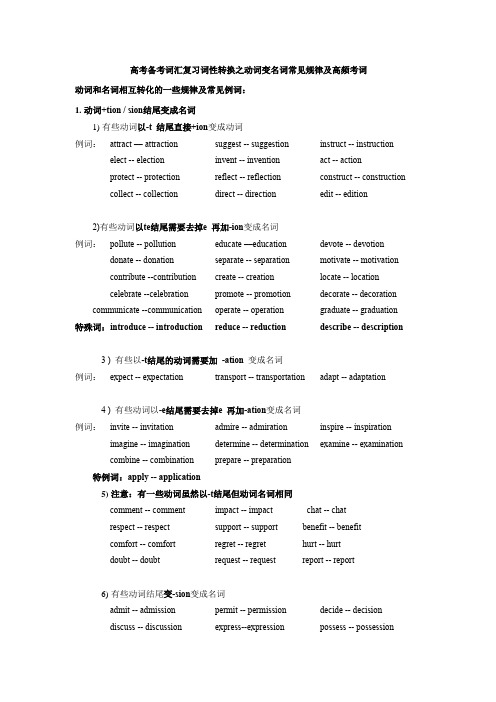
高考备考词汇复习词性转换之动词变名词常见规律及高频考词动词和名词相互转化的一些规律及常见例词:1.动词+tion / sion结尾变成名词1)有些动词以-t 结尾直接+ion变成动词例词:attract –– attraction suggest -- suggestion instruct -- instruction elect -- election invent -- invention act -- actionprotect -- protection reflect -- reflection construct -- constructioncollect -- collection direct -- direction edit -- edition2)有些动词以te结尾需要去掉e 再加-ion变成名词例词:pollute -- pollution educate ––education devote -- devotion donate -- donation separate -- separation motivate -- motivationcontribute --contribution create -- creation locate -- locationcelebrate --celebration promote -- promotion decorate -- decoration communicate --communication operate -- operation graduate -- graduation 特殊词:introduce -- introduction reduce -- reduction describe -- description3 ) 有些以-t结尾的动词需要加-ation 变成名词例词:expect -- expectation transport -- transportation adapt -- adaptation4 ) 有些动词以-e结尾需要去掉e 再加-ation变成名词例词:invite -- invitation admire -- admiration inspire -- inspiration imagine -- imagination determine -- determination examine -- examinationcombine -- combination prepare -- preparation特例词:apply -- application5)注意:有一些动词虽然以-t结尾但动词名词相同comment -- comment impact -- impact chat -- chatrespect -- respect support -- support benefit -- benefitcomfort -- comfort regret -- regret hurt -- hurtdoubt -- doubt request -- request report -- report6)有些动词结尾变-sion变成名词admit -- admission permit -- permission decide -- decisiondiscuss -- discussion express--expression possess -- possessionimpress-- impression conclude -conclusion2.动词+ ment 变成名词例词:achieve –– achievement develop –– development agree -- agreement advertise -- advertisement govern -- government amuse -- amusementmanage -- management excite -- excitement disappoint -- disappointmentappoint -- appointment treat -- treatment adjust -- adjustmentarrange -- arrangement invest -- investment argue -- argument3.动词+ance变成名词例词:allow -- allowance appear -- appearance disappear -- disappearance perform -- performance guide -- guidance rely -- reliance 特例词:exist -- existence refer – reference prefer – preference4.动词+ing变成名词例词:end -- ending train -- training mean -- meaningsay -- saying understand -- understanding greet -- greeting5.其他一些变化及不规则变化常见词appro ve -- appro val survive -- survival arrive -- arrivalbelie ve -- belie f relieve -- relief behave--behaviorserve -- service solve -- solution apologize -- apologycomplain -- complaint compete -- competition respond -- responseaffect -- effect fail -- failure succeed-- successmix -- mixture analyze -- analysis press -- pressuregrow -- growth discover -- discovery choose -- choice。
动词名词化

德语的名词化在德语的科学、技术以及其他专业文章中,为了使语言经济、具有客观性、一目了然,大多使用名词语体,即将动词、形容词或其他词构成名词或由句子名词化——转化为名词词组。
例如:Man baut das Hochhaus. -- Der Bau des Hochhauses ...... Mein Freund kommt. -- Die Ankunft meines Freundes ......Er ist höflich -- Seine Höflichkeit ......上面句子中的Bau,Ankunft,Höflichkeit 是由动词和形容词转化的名词。
下面介绍一些转换的规律:1 动词与名词的转换1.1 派生词结尾+ 后缀示例备注-en -ung bestellen – eBestellung 一般都为阴性例外:r Sprung-en -e fragen - e Frage 阴性-en -t fahren - e Fahrt 阴性-igen, -lichen 结尾-ung vereinigen - eVereinigungverwirklichen - eVerwirklichung阴性,带不可分前缀–ieren -ung regieren - eRegierung 外来语例外:protestieren - r Protest,kontrollieren - e Kontrollekorrigieren - e Korrektur,reformieren - e Reform,interessieren - s Interesse, telefonieren - s-enz existieren - eExistenz-ion-ation -ktion -kation -ition -ssion -ion sition: demonstrieren - e Demonstrationproduzieren - e Produktionkommunizieren - e Kommunikationdefinieren - e Definitiondiskutieren - eDiskussionfunktionieren - e Funktionkomponieren - e Komposition Telefonatstudieren - s Studium1.2 转类词不定式大写f ehlen – sFehlenwissen - sWissen中性动词词根kaufen – rKaufanfangen - rAnfang一般为阳性antworten - eAntwortfeiern - eFeier阴性例外: baden - s Bad ,loben - s Lob过去时(强变化)gehen - rGangwachsen - r Wuchs阳性过去分词(强变化)finden - rFundschwingen -r Schwung阳性。
英语单词词性转换的基本规律
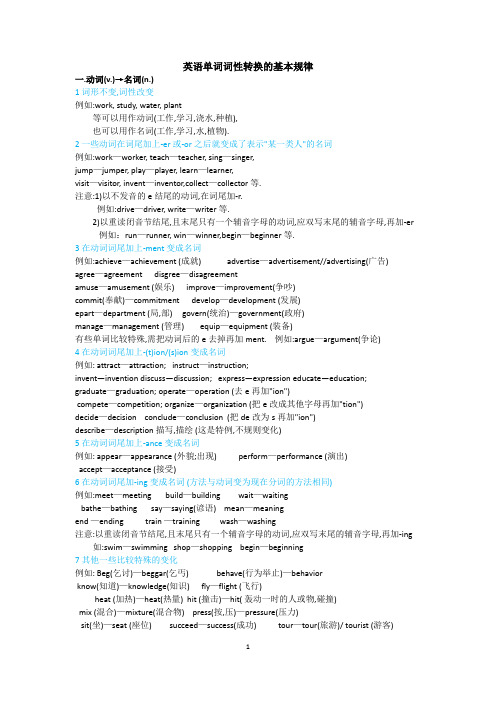
英语单词词性转换的基本规律一.动词(v.)→名词(n.)1词形不变,词性改变例如:work, study, water, plant等可以用作动词(工作,学习,浇水,种植),也可以用作名词(工作,学习,水,植物).2一些动词在词尾加上-er或-or之后就变成了表示"某一类人"的名词例如:work—worker, teach—teacher, sing—singer,jump—jumper, play—player, learn—learner,visit—visitor, invent—inventor,collect—collector等.注意:1)以不发音的e结尾的动词,在词尾加-r.例如:drive—driver, write—writer等.2)以重读闭音节结尾,且末尾只有一个辅音字母的动词,应双写末尾的辅音字母,再加-er例如:run—runner, win—winner,begin—beginner等.3在动词词尾加上-ment 变成名词例如:achieve—achievement (成就) advertise—advertisement//advertising(广告) agree—agreement disgree—disagreementamuse—amusement (娱乐) improve—improvement(争吵)commit(奉献)—commitment develop—development (发展)epart—department (局,部) govern(统治)—government(政府) manage—management (管理) equip—equipment (装备)有些单词比较特殊,需把动词后的e去掉再加ment. 例如:argue—argument(争论)4在动词词尾加上-(t)ion/(s)ion变成名词例如: attract—attraction; instruct—instruction;invent—invention discuss—discussion; express—expression educate—education; graduate—graduation; operate—operation (去e再加"ion")compete—competition; organize—organization (把e改成其他字母再加"tion") decide—decision conclude—conclusion (把de改为s再加"ion") describe—description描写,描绘 (这是特例,不规则变化)5在动词词尾加上-ance变成名词例如: appear—appearance (外貌;出现) perform—performance (演出)accept—acceptance (接受)6在动词词尾加-ing变成名词 (方法与动词变为现在分词的方法相同)例如:meet—meeting build—building wait—waitingbathe—bathing say—saying(谚语) mean—meaningend —ending train —training wash—washing注意:以重读闭音节结尾,且末尾只有一个辅音字母的动词,应双写末尾的辅音字母,再加-ing 如:swim—swimming shop—shopping begin—beginning7其他一些比较特殊的变化例如: Beg(乞讨)—beggar(乞丐) behave(行为举止)—behaviorknow(知道)—knowledge(知识) fly—flight (飞行)heat (加热)—heat(热量) hit (撞击)—hit( 轰动一时的人或物,碰撞)mix (混合)—mixture(混合物) press(按,压)—pressure(压力)sit(坐)—seat (座位) succeed—success(成功) tour—tour(旅游)/ tourist (游客)1动词后面加able,以e结尾的动词则去e加able,表示具有此性质,特点或属性.例如: afford-affordable;love-lovable2动词后面加ed,以e结尾的动词则直接加d,表示被动性的属性或特点.例如: scatter-scattered use-used2不规则的动词则必须记忆,记住其过去分词形式.规律不大,意义同(b).三.名词(n.)→形容词(adj.)1在名词后面加-y可以变成形容词(尤其是一些与天气有关的名词)例如: rain—rainy, cloud—cloudy, wind—windy, snow—snowy,health—healthy, luck—lucky,anger—angry guilt—guilty(内疚的)tourist—touristy(游客多的) , salt (盐)—salty (咸的)silk(丝绸)—silky(丝绸般的), sleep—sleepy (昏昏欲睡的)注意:1)如果以重读闭音节结尾,且词尾只有一个辅音字母,这时应双写辅音字母再加"-y".如: sun—sunny, fun—funny, fog—foggy(有雾的), fur—furry(毛皮的)2)少数以不发音的e结尾的名词变为形容词时,应去掉e再加"-y".如: noise—noisy, ice—icy, shine—shiny(发亮的), taste(口味)—tasty(甜的)2名词后面加-ed,以e结尾的直接加d.例如: spot(斑点)—spotted(有斑点的); talent—talented (有天赋的)organize—organized 有组织的; balance—balanced(平衡的)3一些抽象名词在词尾加-ful可以变为形容词例如:care—careful, thank1—thankful, help—helpful, use—useful, meaning—meaningful 4在名词后加-less构成含有否定意义的形容词例如:care—careless(粗心的), use—useless(无用的)hope—hopeless(没希望的),home—homeless(无家可归的)5一些以-ce结尾的名词,把-ce改为-t变成形容词例如: difference—different, silence—silent, confidence—confident6.在名词后加-ly变为形容词例如: friend—friendly, love—lovely, live---lively7.在名词后加-ous变为形容词例如: danger—dangerous8名词后面加-al变为形容词例如: music—musical; medicine—medical (这个比较特殊)9名词后面加-able变为形容词,如果以e结尾就去e再加"-able".例如: adjust—adjustable 可调整的 value—valuable有价值的10名词后面加-en变成形容词例如: wood—wooden 木制的 wool—woolen 羊毛的11一些表示国家的名词可以在词尾加-ese, -ish或-n构成表示国籍,语言的形容词例如:China—Chinese, Japan—Japanese, England—English,America—American, India—Indian, Australia —Australian(注意Canada—Canadian)▲一般在形容词的词尾加-ly可以变成副词例如: quick—quickly, slow—slowly, loud—loudly, sudden—suddenly 等但是,以下几点值得注意:1一些以"辅音字母+y"结尾的形容词,要把y改为i再加-ly例如: happy—happily, angry—angrily, lucky—luckily, heavy—heavily, noisy—noisily有些以-ble或-le结尾的形容词,去掉e加-y例如:possible—possibly, terrible—terribly3少数以e结尾的形容词,要去掉e再加-ly例如: true—truly但绝大多数以e结尾的形容词仍然直接加-ly例如: polite—politely, wide—widely4以-l结尾的形容词变为副词时要在词尾加-ly,以-ll结尾的才在词尾只加-y.例如: usual—usually, careful—carefully, useful—usefullyfull—fully (以-ll结尾的才只加y)PS:有些同学可能对元音辅音以及重读闭音节不是很了解,那我在这里再做下补充说明. 1.英语26个字母中,a e i o u是元音字母, y是半元音字母, 其余都是辅音字母.★所谓半元音就是有时候做元音,有时候做辅音.半元音字母y做元音有: shy,sky 做辅音比如最简单的:yes2.开音节和闭音节开音节分两种:绝对开音节和相对开音节绝对开音节指的是"元音字母结尾"的音节 (例如 we, hi等)相对开音节是指"辅音字母-元音字母-辅音字母-不发音的e"的音节,(r除外). ( 例如,take,make 等)比如:take (在这个单词中,t是辅音,a是元音,k是辅音,e是不发音的元音)◆在开音节中, 元音字母发他们在字母表中的音闭音节, 则是指"辅音字母-元音字母-辅音字母"的音节 ( -al等除外) (例如:leg,cross等)◆在闭音节中,元音字母发不同的音 a e i o u例 sat let sit not nut (试着读下这些单词,这些单词中,元音发的音都不是它们在字母表中发的音)2.英语重读闭音节就是以辅音因素结尾的,而且是重读音节的音节.比如apple 划音节就因该是ap/ple 前面那个ap是一个音节,这个音节以辅音因素p结尾,所以就是闭音节.(仅仅能看出是闭音节,是不是重读闭音节还要看这个音节是不是重读的) 重读闭音节三要素:1. 必须是重读音节;2. 最后只有一个辅音字母;3.元音字母发短元音 ( 说通俗点,打个比方, /u/是短元音,/u:/是长元音)重读闭音节即两个辅音中间夹一个元音.如:sit---sitting begin---beginning(重读在gin这个音节上)●像travel这个单词,"vel"也是"辅音+元音+辅音"的结构,但是重音不在vel这个音节上,所以不用双写"l",可以为travelled,也可以是traveled,更常用的是后者.。
英语名词转换为动词,动词转换为名词,形容词转换成副词,名词转换为形容词。

二、动词变为名词的方法
1.词形不变,词性改变。例如:work,study,water,plant等可以用作动词,也可以用作名词。
2.一些动词在词尾加上-er或-or之后就变成了表示“某一类人”的名词。例如:work—worker,teach—teacher,sing—singer,jump—jumper,play—player,learn—learner,visit—visitor,invent—inventor等。
2)少数以不发音的e结尾的名词变为形容词时,应去掉e再加-y。例如:noise—noisy,ice—icy等。
2.一些抽象名词在词尾加-ful可以变为形容词。例如:care—careful,thank—thankful,help—helpful,use—useful,beauty—beautiful等。
3.一些表示国家的名词可以在词尾加-ese,-ish或-n构成表示国籍、语言的形容词。例如:China—Chinese,Japan—Japanese,England—English,America—American,India—Indian,Australia—Australian(注意Canada—Canadian)。
4.以-l结尾的形容词变为副词时仍然要在词尾加-ly,而不是只加-y。除非是以-ll结尾的才在词尾只加-y。例如:usual—usually,careful—carefully,useful—usefully,full—fully等。
四、名词转化为动词:
book(n书—v预定);seat(n座位—v使就位;落座);water(n水—v浇水);shoulder(n肩膀—v负责任)
动名词转换
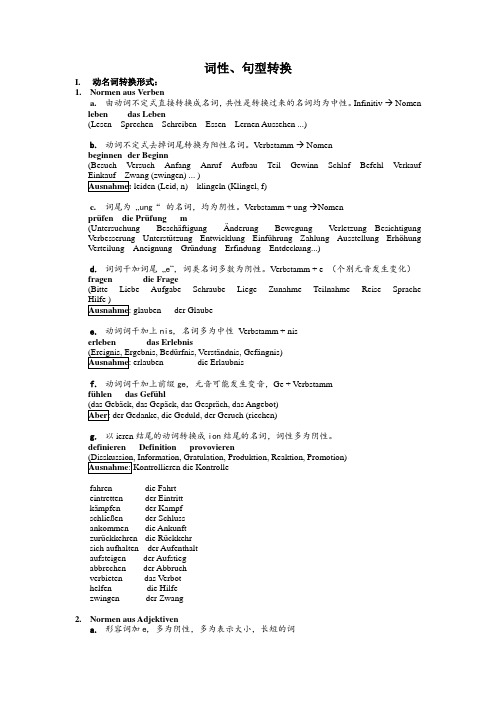
词性、句型转换I.动名词转换形式:1.Normen aus Verbena.由动词不定式直接转换成名词,共性是转换过来的名词均为中性。
Infinitiv → Nomenleben das Leben(Lesen Sprechen Schreiben Essen Lernen Aussehen ...)b.动词不定式去掉词尾转换为阳性名词。
Verbstamm → Nomenbeginnen der Beginn(Besuch Versuch Anfang Anruf Aufbau Teil Gewinn Schlaf Befehl Verkaufleiden (Leid, n) klingeln (Klingel, f)c.词尾为…ung“的名词,均为阴性。
Verbstamm + ung →Nomenprüfen die Prüfung m(Untersuchung Beschäftigung Änderung Bewegung Verletzung Besichtigung Verbesserung Unterstützung Entwicklung Einführung Zahlung Ausstellung Erhöhung Verteilung Aneignung Gründung Erfindung Entdeckung...)d.词词干加词尾…e“, 词类名词多数为阴性。
V erbstamm + e (个别元音发生变化)fragen die Frage(Bitte Liebe Aufgabe Schraube Liege Zunahme Teilnahme Reise Spracheder Glaubee.动词词干加上nis, 名词多为中性Verbstamm + niserleben das Erlebnisrfnis, Verständnis, Gefängnis)die Erlaubnisf.动词词干加上前缀ge, 元音可能发生变音,Ge + Verbstammfühlen das Gefühlck, das Gepäck, das Gespräch, das Angebot)g.以ieren结尾的动词转换成ion结尾的名词,词性多为阴性。
- 1、下载文档前请自行甄别文档内容的完整性,平台不提供额外的编辑、内容补充、找答案等附加服务。
- 2、"仅部分预览"的文档,不可在线预览部分如存在完整性等问题,可反馈申请退款(可完整预览的文档不适用该条件!)。
- 3、如文档侵犯您的权益,请联系客服反馈,我们会尽快为您处理(人工客服工作时间:9:00-18:30)。
宝高高三总复习词语变形归纳★动词与名词的转换(v.----n.)(一)--mentabandon—abandonment accomplish—accomplishment achieve—achievement acknowledge---acknowledgement adjust---adjustment advertise—advertisement agree—agreement amaze—amazement announce—announcement appoint—appointment argue—ar gu ment arrange—arrangement assess—assessment astonish—astonishment attach---attachment attain—attainment commit---commitment develop—development disagree—disagreement disappoint---disappointment discourage---discouragement embarrass---embarrassment equip---equipment excite---excitement employ---employment encourage---encouragement enjoy---enjoymentgovern---government improve---improvement manage---management punish---punishment refresh---refreshment replace---replacement require---requirement retire---retirement settle---settlementtreat---treatment(二)--tionabolish—abolition absorb—absorption accumulate—accumulation accuse—accusation acquire—acquisition adapt—adaptation(改编(本) add—addition admire—admiration admit—admission adopt—adoption adore—adoration allocate—allocation apply—application appreciate—appreciation associate—association assume—assumption attract---attraction calculate—calculation cancel—cancellation celebrate---celebration clarify---clarification classify—classification collect---collection combine---combination communicate---communication compensate—compensation compete—competition complete---completion compromise---compromise concentrate---concentration condemn---condemnation confirm---confirmation congratulate---congratulation connect---connection consider---consideration construct---construction consume---consumption contradict---contradiction contribute---contribution correct---correction(纠正,改正之处)corrupt—corruption create---creationdeclare---declaration decorate---decoration delete---deletion describe—description destroy---destruction determine---determination devote---devotion discriminate—discrimination distribute--distributiondonate---donation elect---election erupt---eruption evaluate—evaluation examine---exam(ination) found---foundationexpect---expectation explain---explanation explore---exploration graduate---graduation hesitate---hesitation imagine---imaginationinform---information inspect---inspection inspire---inspirationinstruct---instruction intend---intention interrupt---interruption introduce---introduction invent---invention invite---invitationirrigate---irrigation multiply---multiplication negotiate---negotiationobserve---observation occupy---occupation operate---operationorganize---organization participate---participation pollute---pollutionpredict---prediction prepare---preparation prescribe---prescription preserve---preservation prevent---prevention produce---productionprohibit---prohibition promote---promotion pronounce---pronunciation protect---protection qualify---qualification react—reactionrealize---realization recommend---recommendation reduce---reductionreflect---reflection regulate---regulation reject---rejectionrelate---relation relax---relaxation repeat---repetition reserve—reservation satisfy---satisfaction select---selectionseparate---separation simplify---simplification starve---starvationsuggest---suggestion transform---transformation translate---translation transport---transport/transportation violate---violation(三)---sionconclude---conclusion confuse---confusion decide---decisiondiscuss---discussion divide---division explode---explosionexpress---expression extend---extension impress---impressionpersuade---persuasion possess---possession revise---revision(四)--turedepart—departure fix---fixture(固定物) furnish---furnituremix---mixture sign---signature(五)--ceaccept—acceptance advise—advice allow---allowance annoy—annoyance appear—appearance avoid—avoidance defend—defence differ---difference disappear---disappearancedisturb---disturbance exist---existence ignore---ignoranceinsure---insurance notify(通知v.)---notice(注意到v.)—notice(通知,注意n.) obey---obedience occur---occurence offend---offence perform---performance prefer—preference pretend---pretence resemble---resemblanceresist---resistance tolerate---tolerance choose—choice(六)--alapprove—approval arrive—arrival betray—betrayal dismiss—dismissal refuse---refusal remove---removalsurvive---survival(七)-ar/or/er(特殊的)beg—beggar compete—competitor conduct---conductoredit—editor educate---educator hang---hanger(衣架,挂钩)—hang(绞刑吏) contain—container(容器) laugh—laughter operate—operatorremind---reminder(提醒物) rob---ro bb er(盗贼) sharpen---sharpener(削刀,磨器) shave---shaver(刮胡刀) terrify---terror translate---translatorvisit---visitor win---winner(八)-ing(s)belong—belongings bless—blessings(多用复数,偶尔用单数)earn---earnings feel---feeling (可数) fill---filling(填充物)find---findings(多用pl.:最终发现的东西,调查结果,判决) gather---gatheringgreet---greetings(多用复数) hear---hearing(听力,听觉) misunderstand---misunderstanding mourn—mourning open---opening save(救,节约)---savings(储蓄) say---saying(格言) suffer---suffering surround---surroundingswarn---warning(九)--yapologize /se—apology consist---consistency deliver---deliverydiscover---discovery enquire---enquiry equal—equalityinjure---injury recover---recovery summarize---summarytend---tendency unite---unity(十)其他变化形式:analyze /se—analysis applaud—applause bathe—bath behave—behavior believe—belief bleed—bloodbury—burial compare---comparison die—deathaffect---effect expose---exposure fail---failureforesee---foresight forgive---forgiveness frighten---frightknow---knowledge lose---loss marry---marriageplease---pleasure prove---proof remain---remains(残余, 遗迹, 遗体) represent---representative(代表) respond—response sing---songsit(坐)---seat(座位) store---storage strengthen(强化)---strength(力量,强项) succeed---success weigh---weight withdraw---withdrawal(十一)相同形式abuse—abuse ache—ache access--accessaid—aid aim—aim alarm--alarmamount—amount anchor—anchor answer--answer approach—approach arrest—arrest attack--attackattempt—attempt bargain—bargain bark---barkback(后退,支持)—back(后面,后背)benefit—benefitbid—bid bite—bite block—blockblow(吹)—blow(打击) boil—boil boom--boomboard(上船/车/飞机/..,盖上木板,搭伙) —board (木板,甲板,伙食,董事会)bomb—bomb bond—bond bother—bother bounce—bounce bow(弯腰,鞠躬)—bow(弓,弓形物,蝴蝶结)boycott—boycott brake—brake break—break broadcast—broadcast brush—brush build—building(建筑(物) burst—burst butcher—butcher button---buttoncall—call calm/calmness—calm campaign—campaigncare—care cash---cash cast---castcatch---catch cause---cause change(变化)—change (变化c.;零钱u.c.) charge—charge chat---chat cheat--cheat(骗子,骗人的事)- check—check cheer---cheer circle—circleclap---clap color---color comb---combcomfort—comfort command---command comment---commentconcern---concern conduct---conduct control---controlcopy---copy cost---cost cough---coughcover---cover crash---crash crowd---crowdcry—cry cut---cut dance---dancedamage---damage dash---dash date---datedebate---debate decline---decline decrease—decrease defeat—defeat delay—delay delight---delightdemand---demand deposit—deposit desert(抛弃遗弃)—desert(不毛之地,沙漠) design---design desire---desire discount---discountdislike---dislike dive---dive divorce---divorcedoubt---doubt download---download draft---draftdream—dream dress---dress drill—drilldrop---drop e-mail---email envy---envyenvelope(包住,裹住)—envelope escape---escape exchange---exchangeexcuse---excuse exercise----exercise experience---experience experiment---experiment export---export face(面对,朝着)---face(脸) influence---influence fall---fall fancy---fancyfax---fax fear---fear fight---fightfigure(计算)---figure(数字,人物,体形,肖像) film---filmfloat---float(漂浮物) flood---flood fly(飞)---fly(苍蝇)focus---focus fool(愚弄)---fool(傻子) force(强迫)---force(力量,武力,军队pl.) forecast---forecast form(形成)---form(形式,表格) function---functiongain---gain glance---glance glare---glareguarantee---guarantee guess---guess guide---guidance(指导)—guide(向导,指南) hand(递交)---hand(手) handle(拿,处理,操纵)---handle(把手,理由) harm—harmharvest---harvest hate---hate head(率领)—head(头)help---help hire---hire hit---hit(击中,成功)honor(尊敬,给…以荣誉)—honor hook---hookhope---hope host(主办)—host hug---hughunger---hunger hurry---hurry hurt----hurtimport---import increase---increase influence—influenceinterest---interest interview---interview jog---jogjudge(评判)---judge (法官,评委)---judg(e)ment(判断) jump---jumpkick---kick kiss—kiss knock---knocklack---lack land---land leak---leakleave---leave(准许,假期) lie---lie limit---limitline(站队,排成)---line(绳索,线条,行列,一行,台词) link---linklist---list litter(乱丢东西)---litter(废弃物,一窝) load---loadlock---lock look---look link---linklove---love mail---mail marchmark---mark market---market mask---maskmaster---master match---match(火柴,比赛,匹配) matter--mattermeasure---measure meet---meet/meeting(会议,聚会) mention--mentionmind(介意)---mind(心,头脑,智力,想法) mine(开矿)---mine(矿井,地雷) miss(错过,想念,)—miss(小姐,不中,省略) mistake---mistakemop---mop murder---murder name---namenod---nod note---note offer---offeroil(加油,上油)---oil order---order part(分别)--part(部分,角色,区域) pause---pause phone---phone picnic---picnicpin---pin place(放)—place (地方) plan---planplant—plant(植物,工厂) play---play plot---plotpoint---point poison---poison polish---polishpractice/se---practice praise---praise preview---previewprocess---process progress—progress promise---promisepull—pull pump---pump purchase---purchasepush---push puzzle---puzzle quake---quakequarrel---quarrel question---question queue—queuerace---race rain---rain range---rangerate(申斥, 斥责, 骂,把(某人)轰走)—rate-(率,比率) reach--reachreason---reason recycle---recycle reform---reformregard---regard(尊敬,问候pl.) register---register relay---relayregret--regret remark---remark rent---rentrepair---repair reply---reply report---reportrequest---request rescue---rescue research—researchresign---resign respect---respect rest---restresult---result return---return review---reviewride---ride ring---ring rise---riserisk---risk roll---roll row---rowruin---ruin run---run rush---rushsacrifice---sacrifice salute---salute scan---scanscare---scare schedule---schedule score---scorescratch---scratch scream---scream screen(遮挡)—screen(屏幕) search---search seat(使…就座)---seat(座位) sense---senseset(放置,安装,布置)—set((一)套,接收器) shake---shakeshape---shape share(分担分享)--share(份额,股份) shelter---sheltership(用船装运)---ship(轮船)---shipment(装货) shock---shockshoot(发射,飞速移动)---shoot(芽苗)—shot(枪声,射击) shout---shoutshow---show sigh---sigh skip—skipsleep---sleep slide---slide smell—smell smile—smile smoke(抽烟)—smoke(烟雾)—smoking(抽烟)—smoker(抽烟者) sneeze—sneeze sniff---sniff snow—snowsob---sob sort---sort sound(听起来)---sound(声音) sow(播种)---sow(大母猪) speed---speed spin---spinspray(喷射)---spray(浪花,喷雾器) spot---spot spread---spreadspy(监视)—spy(间谍) stand(站)---stand(看台) star(演戏)---star(星星,明星) stare---stare start---start stay---staystep---step stick(坚持,粘贴,刺)---stick(棍子,手杖) stress---stressstop---stop strike(打击,罢工)---strike(罢工) struggle---strugglestudy(学习,研究)---study(学习,书房) suit(适合)---suit(一套衣服) supply---supply support---support surprise---surprise swallow(吞咽)—swallow(燕子) swing---swing switch—switchtalk---talk target---target taste---tastetear(撕)---tear(眼泪) telephone---telephone test---testthank---thank thunder---thunder tie(即)---tie(领带)time(计时,安排时间)---time(时间,时代) tip---tiptoast---toast total---total touch---touch trade---tradetrap---trap travel---travel treasure---treasuretrouble---trouble trust---trust twist---twistupdate---update visit---visit volunteer---volunteervote---vote walk---walk waste---wastewatch(观看,注意)---watch(看守,值班人,表) water—waterwater(浇水,给…水喝)---water(水) wave---wavewear---wear whisper---whisper w i nd(〔ai:〕缠绕,迂回前进,上发条)---w i nd(风) wipe---wipe wish---wish witness---witnesswonder(想知道,奇怪)---wonder(奇迹,奇怪) work---workworry---worry wound(打伤,击伤)---wound(伤口,创伤) wrestle---wrestlewrinkle---wrinkle yell---yell yawn---yawnzip(发出飕飕声,拉拉链)---zip(拉链,精神,活力) zoom---zoom(十二)不同名词形式不同语义的情况accompany—company(陪伴;伙伴;一伙人;公司等)---accompaniment(伴随发生的情况;伴奏) advance—advance(前进;进展进步;设法接近;预支)—advancement(促进;提升;推进) act—acting(演技;演戏--)—activity(活动)--- act(多作可数名词表“行为”)—action(行为)accelerate—accelerator(加速器)—acceleration(加速)affect(影响;假装;喜欢)—effect(影响)—affection(深挚的感情;爱情)—affectation(矫揉造作) arm(武装)—army(军队)--armament(军备,武装起来)assist—assistant(助手)—assistance(帮助)attend—attention(注意(力)--attendant(服务员)—attendance(出席,参加,出席的人) advocate—advocate(倡导者,拥护者)—advocacy(倡导)bear—birth(生日)—bearer(拿。
